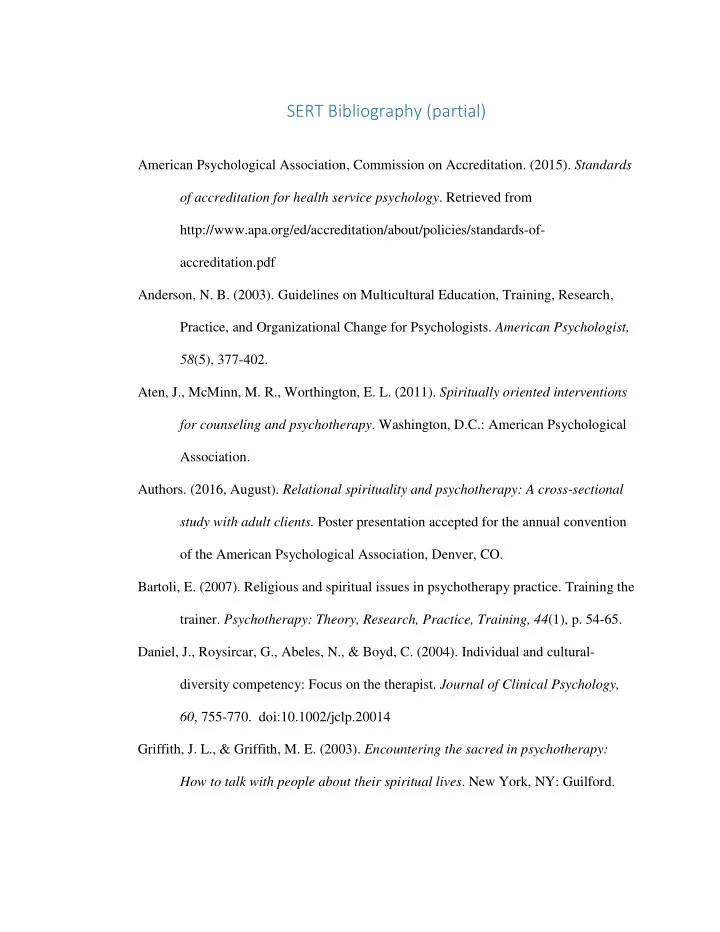

SERT Bibliography (partial) American Psychological Association, Commission on Accreditation. (2015). Standards of accreditation for health service psychology . Retrieved from http://www.apa.org/ed/accreditation/about/policies/standards-of- accreditation.pdf Anderson, N. B. (2003). Guidelines on Multicultural Education, Training, Research, Practice, and Organizational Change for Psychologists. American Psychologist, 58 (5), 377-402. Aten, J., McMinn, M. R., Worthington, E. L. (2011). Spiritually oriented interventions for counseling and psychotherapy . Washington, D.C.: American Psychological Association. Authors. (2016, August). Relational spirituality and psychotherapy: A cross-sectional study with adult clients. Poster presentation accepted for the annual convention of the American Psychological Association, Denver, CO. Bartoli, E. (2007). Religious and spiritual issues in psychotherapy practice. Training the trainer. Psychotherapy: Theory, Research, Practice, Training, 44 (1), p. 54-65. Daniel, J., Roysircar, G., Abeles, N., & Boyd, C. (2004). Individual and cultural- diversity competency: Focus on the therapist. Journal of Clinical Psychology, 60 , 755-770. doi:10.1002/jclp.20014 Griffith, J. L., & Griffith, M. E. (2003). Encountering the sacred in psychotherapy: How to talk with people about their spiritual lives . New York, NY: Guilford.
Hardy, K. V., & Laszloffy, T. A. (1995). The cultural genogram: Key to training culturally competent family therapists. Journal of Marital and Family Therapy, 21 (3), p. 227-237. 10.1111/j.1752-0606.1995.tb00158.x Hook, J. N., Davis, D. E., Owen, J., Worthington, E. L., & Utsey, S. O. (2013). Cultural humility: Measuring openness to culturally diverse clients. Journal of Counseling Psychology, 60 (3), 353-366. doi:10.1037/a0032595 Knapp, S., Lemoncelli, J., & VandeCreek, L. (2010). Ethical responses when patients’ religious beliefs appear to harm their well-being. Professional Psychology: Research and Practice , 41 (5), 405–412. doi:10.1037/a0021037. Koenig, H., King, Dana E., & Carson, Verna Benner. (2012). Handbook of religion and health (2nd ed.). New York: Oxford University Press. Martinez, J. S., Smith, T. B., & Barlow, S. H. (2007). Spiritual interventions in psychotherapy: Evaluations by highly religious clients. Journal of Clinical Psychology, 63, 943-960. doi:10.002/jclp.20399 McAdams, D. P. (1997). The stories we live by: Personal myths and the making of the self. New York: The Guilford Press. Miller, M. M., Korinek, A. W., & Ivey, D. C. (2006). Integrating spirituality into training: The Spiritual Issues in Supervision Scale. American Journal of Family Therapy , 34 (4), 355-372. doi:10.1080/01926180600553811 Morgan, J., & Sandage, S. J. (2016). A developmental model of interreligious competence. Archive for the Psychology of Religion, 38, 129-158. Pargament, K. I. (2007). Spiritually integrated psychotherapy: Understanding and addressing the sacred. New York: Guilford Press.
Pargament, K., Exline, Julie J, & Jones, James William. (2013). APA handbook of psychology, religion, and spirituality. Vol. 1, Context, theory, and research (APA handbooks in psychology). Washington, D.C.: American Psychological Association. Pargament, K., Magyar‐Russell, G., & Murray‐Swank, N. (2005). The Sacred and the Search for Significance: Religion as a Unique Process. Journal of Social Issues, 61 (4), 665-687. Pew Research Center. (2015). U.S. public becoming less religious (November 3, 2015). Retrieved from The Pew Research Center Religion and Public Life website: http://www.pewforum.org/2015/11/03/u-s-public-becoming-less- religious/ Rønnestad, M. H., & Orlinsky, D. E. (2005). Clinical Implications: Training, Supervision, and Practice. In D. E. Orlinsky, M. H. Rønnestad, & Collaborative Research Network of the Society for Psychotherapy Research, How psychotherapists develop: A study of therapeutic work and professional growth. (pp. 181–201). Washington: American Psychological Association. https://doi.org/10.1037/11157-012 Rønnestad, M. H., & Skovholt, T. M. (2013). The developing practitioner: Growth and stagnation of therapists and counselors . New York, NY, US: Routledge/Taylor & Francis Group. Saunders, M. S., Petrik, M. L., & Miller, M. L. (2014). Psychology doctoral students’ perspectives on addressing spirituality and religion with clients: Associations
with personal preferences and training. Psychology of Religion and spirituality, 6 (1), 1-8. doi:10.1037/a00035200 Sorenson, R.L. (2004). Minding spirituality . Hillsdale, NJ: The Analytic Press. Sperry, L. (2016). Assessing spiritually sensitive clinical practice: Some evaluation guidelines. Spirituality in Clinical Practice , 3 (3), 167-170. doi:10.1037/scp0000112 Stavros, G., & Sandage, S.J. (2014). The skillful soul of the psychotherapist. In G. Stavros & S.J. Sandage (Eds.), The skillful soul of the psychotherapist: The link between spirituality and clinical excellence (pp. 1-16). Lanham, MD: Rowman & Littlefield. Sue, D. W., & Sue, D. (2015). Counseling the culturally diverse: Theory and practice (7 th ed.). New York: Wiley & Sons. Tillman, D. R., Dinsmore, J. A., Hof, D. D., & Chasek, C. L. (2013). Becoming confident in addressing client spiritual or religious orientation in counseling: A grounded theory understanding. Journal of Spirituality in Mental Health, 15, 239-255. Tummala-Narra, P. (2016). Psychoanalytic theory and cultural competence in psychotherapy. Washington, DC: American Psychological Association. Vieten, C., & Scammell, S. (2015). Spiritual and religious competencies in clinical practice: Guidelines for psychotherapists and mental health professionals . Oakland, CA: New Harbinger Publications, Inc.
Vieten, C., Scammell, S., Pilato, R., Ammondson, I., Pargament, K. I., & Lukoff, D. (2013). Spiritual and Religious Competencies for Psychologists. Psychology of Religion and Spirituality . Advance online publication. doi: 10.1037/a0032699 Vieten, C., Scammell, S., Pierce, A., Pilato, R., Ammondson, I., Pargament, K. I., & Lukoff, D. (2016). Competencies for psychologists in the domains of religion and spirituality. Spirituality in Clinical Practice , 3 (2), 92–114. https://doi.org/10.1037/scp0000078 Vogel, M. J., McMinn, M. R., Peterson, M. A., & Gathercoal, K. A. (2013). Examining religion and spirituality as diversity training: A multidimensional look at training in the American Psychological Association. Professional Psychology: Research and Practice , 44 (3), 158-167. doi:10.1037/a0032472
Recommend
More recommend